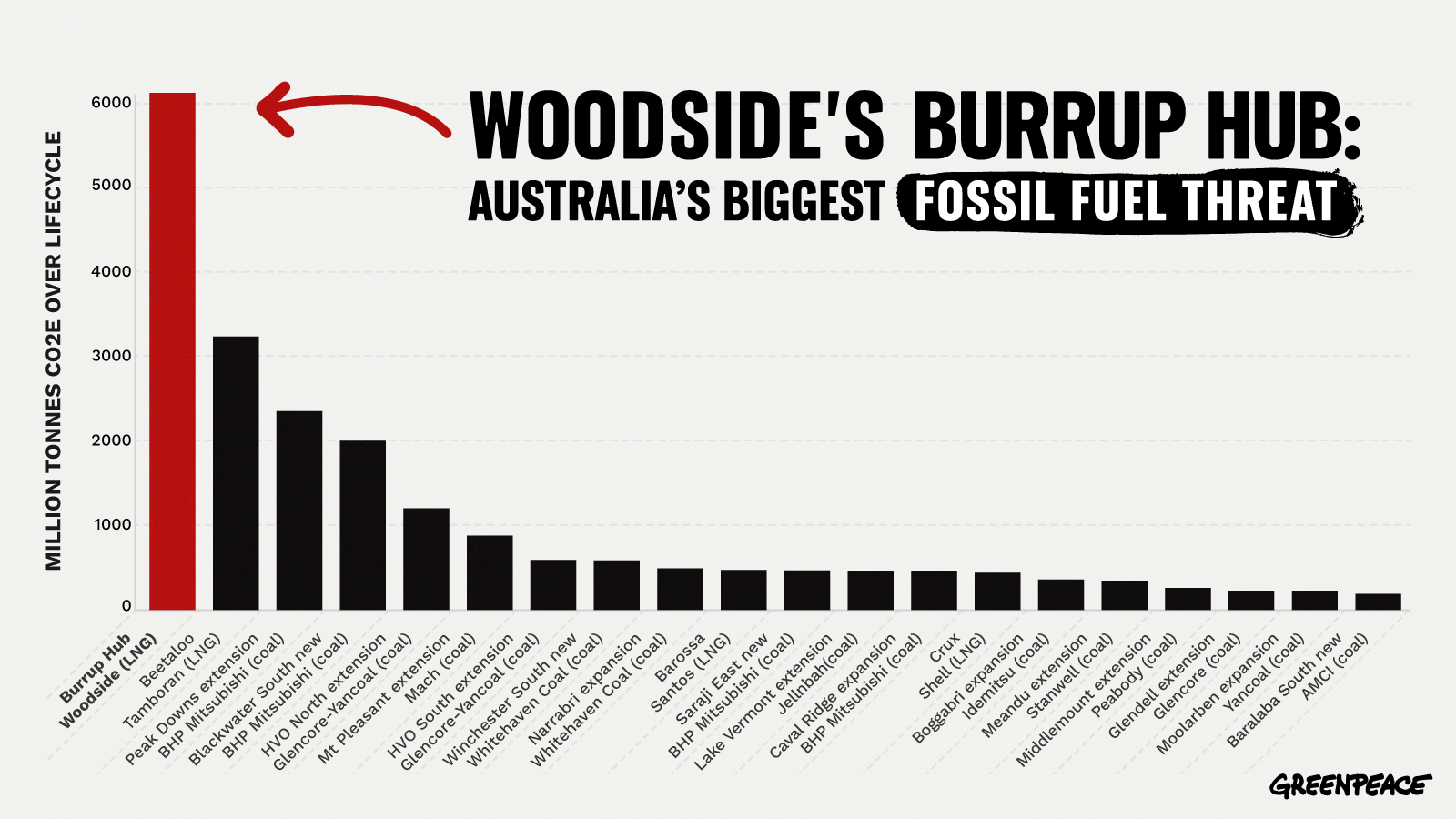New analysis released today has revealed that Woodside's Burrup Hub is Australia's biggest climate threat, belching out 6.1 billion tonnes of greenhouse gas emissions over its proposed 50-year lifetime.
The new data from Greenpeace shows that the predicted emissions from Woodside's Burrup Hub are far greater than all other proposed fossil fuel projects currently undergoing federal environmental approvals.
The Burrup Hub's emissions are bigger than the combined total of the next two largest proposed fossil fuel projects in Australia: the Beetaloo Tamboran and the Peak Downs Extension.
The data comes as Western Australian experts and campaigners join today's roundtable discussion on the Burrup Hub hosted by West Australian MPs Kate Chaney and Josh Wilson, including the Conservation Council of WA, Environs Kimberley, Doctors for the Environment WA and Greenpeace.
The delegation will highlight the staggering climate threat of Woodside's Burrup Hub, alongside evidence of the devastating nature impacts.
The Browse field, the most polluting part of the Burrup Hub, would see up to 50 gas wells drilled around the stunning Scott Reef, which is home to endangered pygmy blue whales and green turtles.
*Graph verified by Greenpeace, emissions data sourced from Sunrise, Climate Analytics and Greenpeace.
Jess Panegyres, Head of Clean Energy Transition at Greenpeace Australia Pacific said:
"This data proves that Woodside's massive Burrup Hub project is far and away the most polluting fossil fuel proposal in Australia – it's a disaster in the making for our environment and our climate.
"We know that Federal Environment Minister Tanya Plibersek will soon decide whether to let Woodside develop the most polluting parts of the Burrup Hub – Browse, and the Northwest Shelf extension.
"Browse, part of the Burrup Hub, would see gas wells drilled near the stunning Scott Reef, in a Biologically Important Area for endangered pygmy blue whales and turtles. We are asking Minister Plibersek to protect Scott Reef and the endangered species that call it home from Woodside's dangerous project.
"In the last few weeks we've seen Woodside pressuring the government to weaken federal environment laws to make it quicker and easier for Woodside to start seismic testing for the Burrup Hub.
"Woodside CEO Meg O'Neill knows that across Australia communities are increasingly pushing back against new fossil fuel projects, so is trying to rush this through as fast as she can – despite this project's enormous environmental harm."
Anna Chapman, Fossil Fuels Program Manager, Conservation Council of Western Australia said:
"Off Australia's Kimberley coastline, the ecologically vital Scott Reef, the country's largest standalone coral reef, faces severe threats from Woodside's Browse to North West Shelf gas project. This venture, part of the controversial Burrup Hub, plans to extract gas from directly beneath the reef.
"The delicate ecosystem of Scott Reef, already endangered by climate change, confronts further risks, including seismic blasting, and the potential for a catastrophic gas well blowout if Woodside's project proceeds.
"This is a crucial climate and environmental decision for Australia. Federal Environment Minister Tanya Plibersek and State Environment Minister Reece Whitby must reject these proposals."
Dr Richard Yin, Deputy Chair Doctors for the Environment Australia said:
"Climate care is health care. If the Burrup Hub project proceeds, emissions from the project will fuel further devastating heatwaves and bushfires such as those that Perth has recently experienced which has threatened homes and lives.
"Across our state, from floods and extreme heat in the north, through to droughts and bushfires in the south, we are highly vulnerable to climate change impacts. For the sake of our children and their future health, the Burrup Hub project must not proceed."
Martin Pritchard, Director of Strategy, Environs Kimberley said:
"Communities in the Kimberley's Fitzroy Valley were devastated by the biggest recorded floods in Western Australia's history earlier this year and what the science tells us is that opening new oil and gas fields is going to lead to these catastrophic events happening much more often.
"If fossil fuel proposals like Woodside's Browse Basin gas project at Scott Reef are approved then future temperature projections show us that the Kimberley will be unliveable by the end of this century because it won't be possible to live a healthy life here, it will be too hot.
"Risking Scott Reef and the Kimberley coast to oil and gas pollution is strongly opposed by the community and a spill there would devastate the globally significant marine hotspot and multi-million dollar tourism industry."







